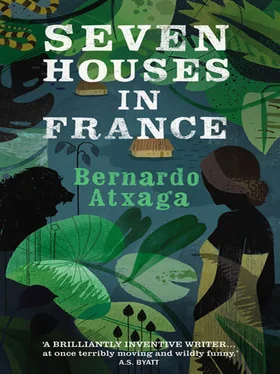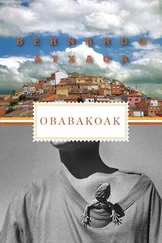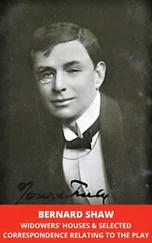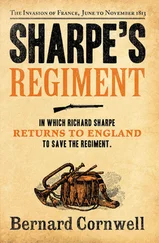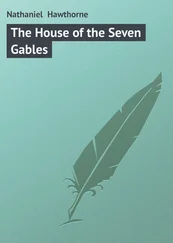The hunt for monkeys brought Van Thiegel some rest, because it required all his concentration and left him so physically exhausted that he could at least manage to sleep. On the third day, however, the images inside his head began to proliferate, just as they did when he got drunk. Chrysostome, Lalande Biran, Donatien, Livo, his mother, his father, King Léopold, the legionnaire with the four balls, all of them and many more were there, visible, so to speak, to his inner eye. He feared that, as had happened on other occasions, the images would start to spin around on the roulette wheel, but this didn’t happen, because the image of Chrysostome imposed itself on all the others: Chrysostome with the top three buttons of his shirt undone; Chrysostome with his blue ribbon and the gold chain he had received from Lopes in exchange for the cartridges; Chrysostome checking the time on the silver watch that Lalande Biran had given him for the rhinoceros horn.
At first, it seemed preferable and far less demanding to have a single image rather than an endlessly spinning roulette wheel of them. However, as the hours passed, he began to see its negative side. The image was telling him the truth, namely, that he was worried and afraid of Chrysostome. That’s why he had fled Yangambi. That’s why he’d persuaded himself that he really should go with the askaris to bring back the captive rubber-tappers, when the askaris could easily have done the job under the command of a black NCO.
There were no two ways about it. He was very frightened. Chrysostome might not find out what had happened to his ‘Madelaine’ at once, but it would be, at most, a matter of a week before he did. Chrysostome would go to her village to visit her, the people there would tell him what had happened; then, naturally, the yokel would come after him to put a bullet through his head. If only he was a bad shot! But even he could not deny that Chrysostome was an exceptionally fine marksman. The man who had felled a cheetah and who, at a distance of nearly two hundred yards, had shot a mandrill through the head, would have no trouble killing him.
This was painful to acknowledge. He, Cocó Van Thiegel, who in his youth had served in the Belgian army, been a sergeant in the Foreign Legion, a lieutenant in the Force Publique, always ready to plunge into battle or join a party hunting for rebels, who, to put it bluntly, had never known fear, that same man now quailed before a mere yokel. He feared him. And this was not a new feeling, it had been there since the very first day.
His mind again split in two.
‘You’re shitting yourself over this,’ said one half.
‘I’m going to tell you what to do,’ said the other half. ‘Go back to Yangambi at night, creep over to Chrysostome’s hut and cut his throat with a machete. End of problem.’
‘And what if he’s awake?’ asked the first half.
The second half did not reply.
Van Thiegel gave the order for the black NCO to set off with the captives. They had to get back to Yangambi, they could wait no longer, and if any of the captives were still too weak, then it would be best to leave them where they were. When the NCO informed him that this would not be the case, that they could have started their return journey the day before, once the men had eaten their fill of monkey meat, Van Thiegel realised even more acutely what lay behind his behaviour. He resolved that he would not be made to look like a coward in front of Richardson, Lopes and the other officers. He must go back and kill Chrysostome as soon as possible.
For a moment, the mere thought of this made the rage he felt at his humiliation far stronger than his fear, and he clung to that feeling on the march back to Yangambi. His intense rage also meant that the image of Chrysostome faded somewhat and was replaced by an analysis of all the possible ways of killing him. How should he do it? The machete was, of course, an option. Another would be to go straight to Chrysostome’s hut as soon as he reached Yangambi and make some mocking remark about his lack of manliness. Chrysostome, enraged by this insult, would immediately reach for his rifle, and Van Thiegel would shoot him, later alleging self-defence. He could also, of course, turn to Lalande Biran for help and make a clean breast of what had happened. ‘Madelaine’ had fought like a tigress, her parrot had kept screaming in the most irritating manner, and while he and Bamu were struggling, he had underestimated his own strength and inadvertently killed her.
‘I know I was wrong, Biran, and I take full responsibility,’ he would say, ‘but if Chrysostome tries to exact his revenge, that will only make matters worse. Regardless of whether he succeeds or not, it will be a bad thing. We are both, after all, members of the Force Publique. Summon him, please, and tell him the punishment laid down in the military code for anyone who kills a colleague.’
The punishment was the firing squad. If Lalande Biran reminded him of this, Chrysostome would immediately understand the rules of the game.
They reached Yangambi that evening, and, having left the rubber-tappers in the hands of the askaris , Van Thiegel had supper with the black NCOs. Then, after dark, he walked over to his residence. No officer was to be seen in the main street or in the Place du Grand Palmier. They were probably all in the Club Royal.
He went into his bedroom, sat down on the bed and poured himself a glass of cognac. Of the various options, turning to Lalande Biran for help seemed the best one. It was the most sensible and the most militarily correct. Lalande Biran was his superior officer and, as such, was obliged to defend him. On the other hand, however cool a customer that yokel Chrysostome was, he would not want to die in front of a firing squad.
The thought of Lalande Biran brought with it the memory of Christine, and he picked up the pillow under which he had hidden her photo. It wasn’t there. He put down his glass and looked underneath the bed. Nothing, only his boots and socks. He went into his office, knowing full well that he would not find the photograph there either. In a flash, he understood. Donatien had spent several days completely alone in Yangambi! He had taken the photo, there was no doubt about it. The dog was always poking his nose in where it wasn’t wanted! The traitor!
He sat down at his desk. The photo would now be in Lalande Biran’s hands. Matters, he realised, were getting complicated.
He sat waiting for Lalande Biran to arrive. He was absolutely sure he would come. His only doubt was how the Captain would react. Would he mention the photograph straight away or launch into one of his speeches, talking about this and that, without coming to the point or giving any clue as to what form his revenge would take? If he did that, thought Van Thiegel, picking up the rifle on the desk to check that it was loaded, he would have no compunction about shooting him because the man had not yet been born who could play cat-and-mouse with him. Then, as Lalande Biran himself never tired of repeating, alea jacta est , the die would be cast. He would kill the Captain, he would kill Donatien, he would kill Chrysostome, and then he would hide in the jungle until things calmed down. He wouldn’t be the first man to desert from the Force Publique. The only snag was that he would have to give up Christine and his dream of making her his woman number 200, but everything had its price.
He saw Richardson standing at the door of his office, as still and timid as a beggar come to ask for alms, his eyes fixed on Van Thiegel’s rifle.
‘What are you staring at?’Van Thiegel asked. Richardson’s presence displeased him. He wanted to see Lalande Biran. And shoot him.
‘We have to talk, Cocó,’ said Richardson. ‘Legionnaire to legionnaire.’
Читать дальше
